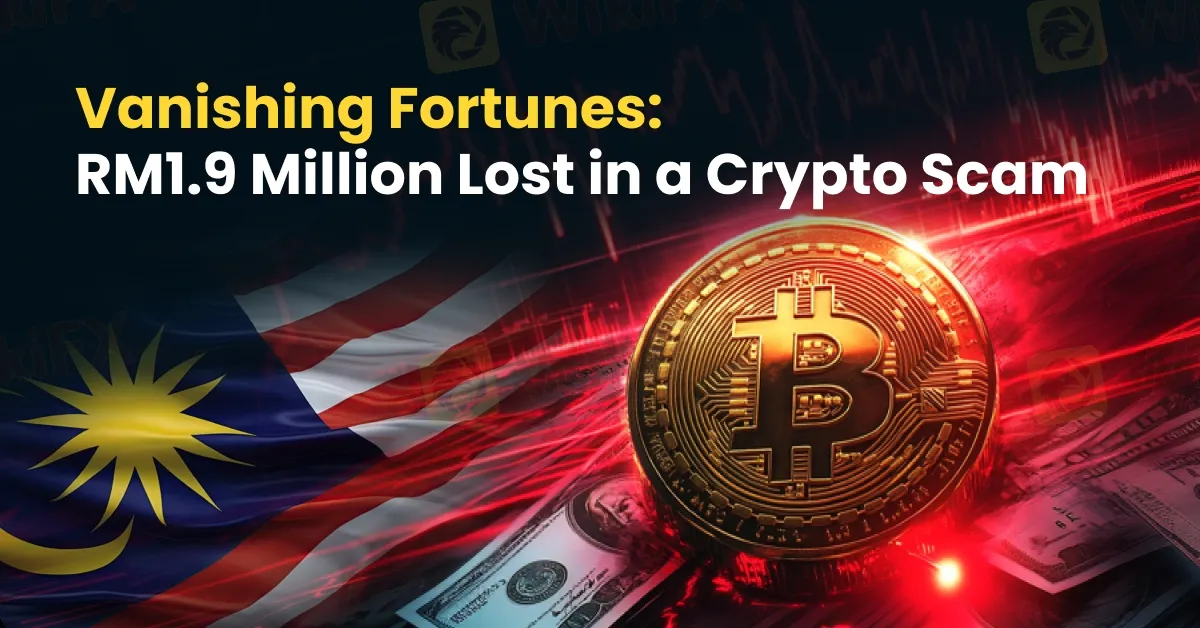简体中文
繁體中文
English
Pусский
日本語
ภาษาไทย
Tiếng Việt
Bahasa Indonesia
Español
हिन्दी
Filippiiniläinen
Français
Deutsch
Português
Türkçe
한국어
العربية
Vanishing Fortunes: RM1.9 Million Lost in a Crypto Scam
Abstract:A 69-year-old plantation manager from Johor has fallen victim to a sophisticated cryptocurrency scam, losing RM1.9 million to a fraudulent investment scheme.

A 69-year-old plantation manager from Johor has fallen victim to a sophisticated cryptocurrency scam, losing RM1.9 million to a fraudulent investment scheme.
Johor police confirmed that the victim was deceived by an unidentified individual who made contact via WhatsApp. The perpetrator convinced him to download an investment application and participate in what was presented as a lucrative cryptocurrency trading opportunity. Enticed by promises of exceptionally high returns ranging from 20 to 40 per cent, the victim followed the instructions provided and began transferring funds.
As part of the scheme, the victims phone number was added to a WhatsApp group, where he received further guidance on making investments. The orchestrators of the fraud provided seemingly legitimate directives, reinforcing the illusion of a credible and profitable trading environment.
Between December 2024 and February 2025, the plantation manager transferred RM1.9 million into multiple bank accounts, believing he was engaging in a legitimate financial opportunity. However, the deception became evident when he attempted to withdraw what was claimed to be US$22.2 million (RM97 million) in profits. Despite multiple attempts, he was unable to access the supposed earnings, that was when he realised this was a scam.

Upon realising the nature of the scam, the victim reported the incident to the authorities. Law enforcement has since launched an investigation under Section 420 of the Penal Code, which pertains to cheating and dishonestly inducing the delivery of property.
Authorities have once again urged the public to exercise caution when engaging in online investment opportunities. They emphasise the importance of verifying the legitimacy of investment platforms before committing funds, particularly those promoted through unofficial channels such as WhatsApp and other messaging applications. Fraudsters frequently use these platforms to lure victims with promises of substantial and rapid returns, capitalising on their lack of awareness regarding the risks associated with unregulated investments.

To help protect individuals from falling prey to unauthorised investment schemes, WikiFX offers essential tools and resources for verifying the legitimacy of brokers and financial platforms. With an extensive database of global broker profiles, regulatory status updates, and user reviews, WikiFX empowers users to make informed decisions before committing to any financial investment. The apps risk ratings and alerts for unlicensed or suspicious entities enable investors to easily spot red flags and avoid potential scams. By checking a broker's background on WikiFX, users can better safeguard their hard-earned savings and steer clear of fraudulent schemes, making WikiFX an indispensable resource for safer investing.

Disclaimer:
The views in this article only represent the author's personal views, and do not constitute investment advice on this platform. This platform does not guarantee the accuracy, completeness and timeliness of the information in the article, and will not be liable for any loss caused by the use of or reliance on the information in the article.
Read more

RM15 Million Gone in Fake Investment Scam
A 77-year-old Malaysian retiree has suffered financial losses totalling RM15.1 million after falling victim to an elaborate share investment scam orchestrated by an individual she knew personally.

Non-Existent Online Scheme Took Away RM580,000
A Malaysian assistant human resources manager has lost nearly RM580,000 to a fraudulent online investment scheme based in Taiwan.

Beware of New Scam Tactics Lurking on WhatsApp!!
A cryptocurrency scam linked to an entity known as “Txex” or “Whalefall” is sweeping across WhatsApp, exploiting the app’s popularity to target investors with promises of extraordinary returns.

You Could Be Next: Scams Stealing Millions from Smart People
Two people have lost close to RM6 million to online investment scams, raising concerns about the growing threat of fraud on digital platforms in Malaysia.
WikiFX Broker
Latest News
Five UK Financial Firms Collapse, FSCS Offers Support for Affected Clients
Why Trade Agreements Matter to Nations
Non-Existent Online Scheme Took Away RM580,000
RM15 Million Gone in Fake Investment Scam
Crypto Traders Hit by Scam Using Fake Regulatory Documents, MFSA Cautions
Trade Fights Are Heating Up—What Happens Next?
Juno Markets Upgrades to FYNXT PAMM
Think Scams Won’t Happen to You? That’s Exactly What Scammers Count On
Beware of New Scam Tactics Lurking on WhatsApp!!
Italy’s CONSOB Blocks Sites of ITradingFX and NEX TRADE in Latest Crackdown
Currency Calculator


